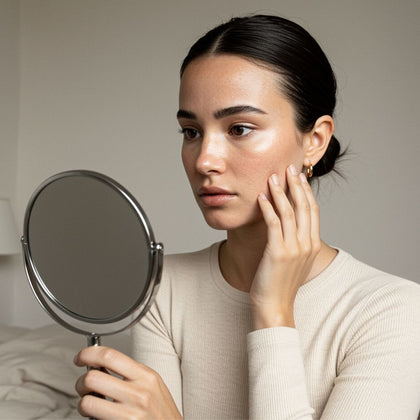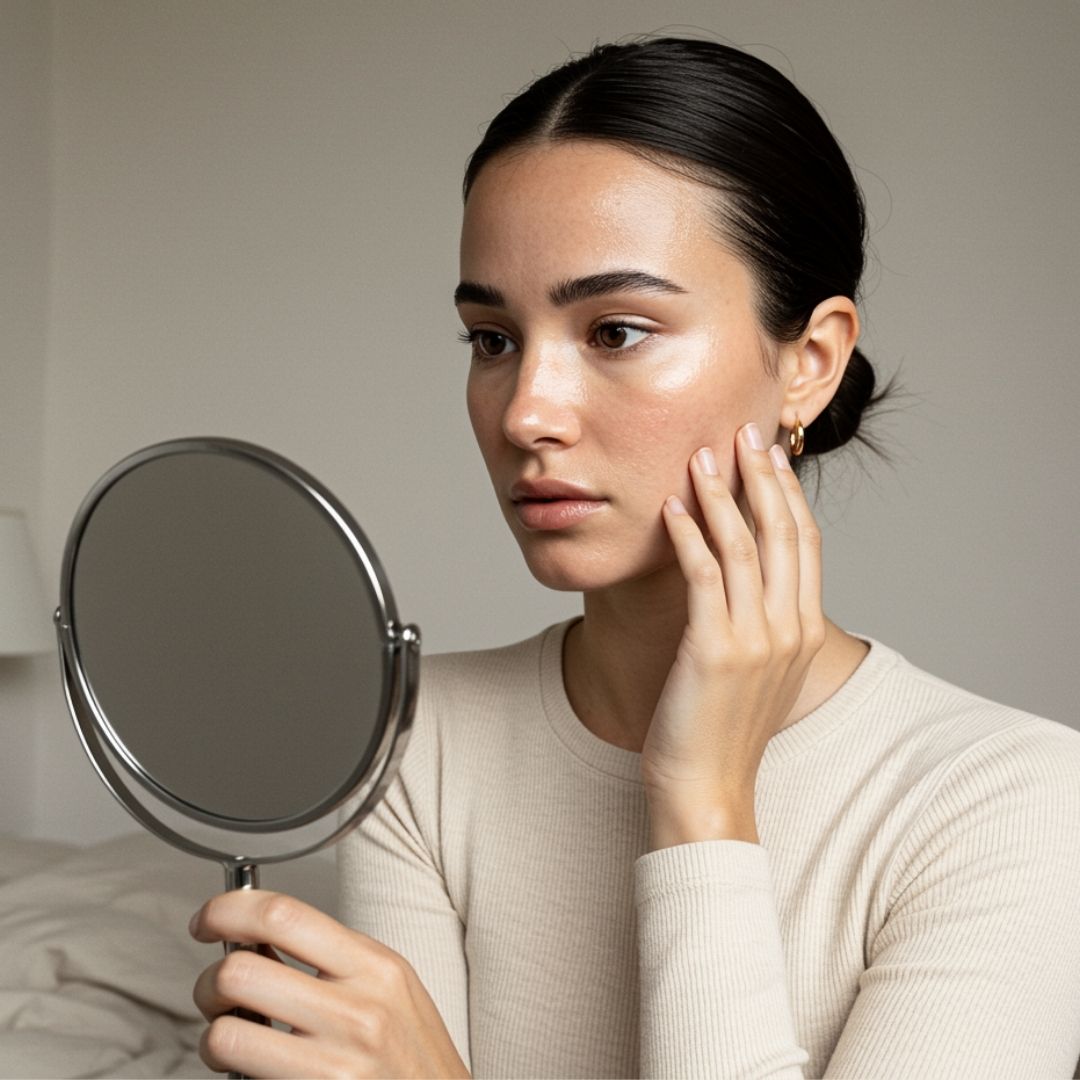
When we talk about our skincare routine, we often think about the stuff we do every day. Cleanser. Toner. Serum. Moisturizer. SPF.
But there are non-daily skincare tasks you should definitely have on your list if you want clear, dewy skin. One of the most important to keep in rotation? Exfoliation.
Exfoliation, though you don’t do it every day, is essential for reaching your skincare goals. Whether you want to clear up acne, apply makeup more smoothly, or achieve Korean glass skin.
If you’ve been skipping regular exfoliation, you’re really missing out on some pretty significant beauty benefits. But don’t worry, it’s not too late to incorporate this step into your routine and start getting all the skincare gains.

What Happens if You Don’t Exfoliate Your Skin Regularly?
Exfoliation is the process of removing dead skin cells from the surface of your skin. And there are a lot of reasons why this is good for your skin! It’s not a trend or a fad, but rather a totally research-backed skincare practice. That’s why it’s earned a spot in so many skincare routines, and it deserves a spot in yours, too.
To help you understand why exfoliation is essential to skincare, we need to break down a few things first. We’ll cover what exfoliation does, what happens if you skip it, and how easily you can incorporate it into your routine.
Here’s what you need to know:

What Does Exfoliating Do?
Unclogs Pores
Dead skin cells are meant to naturally shed off your body. But sometimes, for all kinds of reasons, that dead skin isn’t going anywhere. When it doesn’t shed properly, those cells sit on your face, mix with natural oils, and clog pores. Gross, right?
When this happens, it creates a plug, leading to whiteheads and blackheads. This is especially true for anyone with oily skin. Luckily, exfoliation is an easy way of preventing clogged pores by shedding dead skin cells.
Prevents Ingrown Hairs
When dead skin cells and oil buildup, they can block follicles—clogging pores and causing more than just acne. This buildup can also prevent hair from breaking through the skin properly, making it curl or grow sideways.
The result? Painful ingrown hairs. Exfoliation can help keep pores clear so vellus hair can poke through like it’s supposed to.
Smooths Skin Texture
When dead skin cells build up on your face, they don’t all seep into your pores. If left long enough, those old cells layer up. This creates those dry, dull, rough patches on your skin.
When you exfoliate your face or body, you shed dead skin cells and reveal even, smooth skin underneath. No matter how good your moisturizer is, you can’t get true baby soft skin without exfoliation.
Brightens and Evens Complexion
The skin cells making up those rough patches of skin look dull because they’re lifeless. Remember, they’re dead skin cells. So, if you want your skin to look radiant and glowing, exfoliation is essential.
Exfoliating not only removes dead skin cells but also boosts cell turnover and encourages collagen production. This means fresh, healthy skin rises to the surface, while collagen renews and strengthens those deeper layers of skin. The result? The brightest, most radiant glow yet.
Boosts Product Absorption
Dead skin cells are thick, and most skincare products can’t penetrate them. That means your moisturizer, serums, SPF, and more aren’t reaching the live and youthful skin beneath all the buildup.
These rough skin cell patches also make it hard to get that airbrushed makeup look. Start exfoliating to get the most out of all your skincare and beauty products.
Fades Dark Spots, Acne Scars, and Hyperpigmentation
Dark spots, acne scars, and hyperpigmentation sit on the surface of your skin. As your skin naturally renews, these marks fade away, revealing clearer skin.
Remember, we said that skin cells don’t always shed like they’re supposed to. That means scars and other blemishes can potentially stick around longer than they naturally should. Exfoliation supports the natural cell turnover process, helping your skin stay fresh, youthful, and free of dark spots. helps things along and keeps your skin fresh and youthful.
What Happens When You Don’t Exfoliate?
-
Dead skin cells build up on the surface
-
Skin can look dull, rough, or flaky
-
Clogged pores and increased breakouts
-
Uneven skin tone and texture
-
Products don’t absorb as well
-
Acne scars and dark spots stick around
-
Higher chance of ingrown hairs
-
Skin feels dehydrated
-
Makeup looks patchy or cakey
-
Skin’s natural glow fades
How Often to Exfoliate
To determine how often you should exfoliate, you need to know your skin type. Here’s our general recommendation based on your unique skin:
-
Oily Skin: 2-4 times a week
-
Dry Skin: 1-2 times a week
-
Sensitive Skin: 1 time a week
-
Combination or Acne-Prone Skin: 2-3 times a week
-
Normal Skin: 1-3 times a week

How to Exfoliate Your Skin Properly
Pick a physical or chemical exfoliant.
There are a lot of exfoliating products out there. Before you hit “add to cart,” make sure you know the different types of exfoliants.
Physical Exfoliants: Brushes, cleansing cloths, and scrubs are types of physical exfoliators.
These are a smart choice because they offer instant results. Even better, they also target tougher areas of the body—like legs and elbows. Because, ultimately, skincare doesn’t just mean face care—you should definitely be exfoliating your whole body. However, you want to be mindful when choosing physical exfoliants since they can be harsh on sensitive skin.
For the best physical exfoliants, grab The Skinny Confidential Butter Brush for the body and the Dermalogica Daily Microfoliant for the face. Also, don’t forget to check out “How to Exfoliate Your Lips,” because they deserve some TLC, too.
Chemical Exfoliants: These are products that contain chemicals like beta hydroxy acids (BHA) or alpha hydroxy acids (AHA). These gently dissolve dead skin cells.
Chemical exfoliation isn’t just easier on the skin; these products can also penetrate deeper for a more thorough exfoliation. The downside is that these can take some time to see results.
Some of our favorites are the Glow Recipe Watermelon Glow Sleeping Mask and the Dermalogica Milkfoliant, which was recommended to us by Alex Potora, the founder of Vrea.
Determine frequency based on skin type.
How often you exfoliate really depends on your skin type. If you have sensitive skin, exfoliating too much can lead to irritation and inflammation. On the other hand, oily skin is typically thicker and can handle more frequent exfoliation.
That said, regardless of skin type, you shouldn’t exfoliate every day. Overdoing it can disrupt your natural skin barrier—and we definitely don’t want that. Refer back to our guide to find the right routine for your unique skin type.
Cleanse your skin before starting.
It’s always a good idea to cleanse your skin before you exfoliate. This confirms you’re not pushing oil and dead skin cells deeper into your pores.
It also makes exfoliation more effective because it removes surface-level dirt, oil, and makeup that can act as a barrier. Choose a cleanser containing salicylic acid or hyaluronic acid, like CeraVe Hydrating Cleanser.
Don’t scrub too hard—keep it gentle.
It’s not a case of “the harder you scrub, the better the results.” In fact, going too hard can backfire by irritating skin, causing redness, or drying it out. Exfoliation is meant to support your skin, not strip it raw.
Stay gentle, listen to how your skin responds, and be patient. Real improvements take time, usually a few weeks, so consistency matters more than intensity.
Follow with moisturizer and sunscreen.
Exfoliation can cause dryness, which is why you want to follow up with a good moisturizer. If you don’t, your body will produce more oil as a response. Then, of course, dry skin can become oily, you might experience acne—it’s a whole thing.
Beyond keeping your skin hydrated, chemical exfoliants can leave you extra vulnerable to UV rays. That’s because they remove the top layer of dead skin cells, which is like the skin’s natural protection. Skipping sunscreen after exfoliating isn’t just a bad idea; it’s an open invitation to sun damage, premature aging, and hyperpigmentation.
For a high-quality mineral sunscreen that’s perfect for your face, grab TSC Caffeinated Sunscreen. And for moisturizer, we recommend Dermalogica BioLumin-C Vitamin-C Gel Moisturizer or the Inkey List Bio-Active Ceramide Moisturizer.
Exfoliate once or twice a week to get the most out of your skincare routine.
Exfoliation is more than just an optional add-on to your skincare routine—it’s essential for achieving healthy, glowing skin. By regularly removing dead skin cells, you’re helping your skin look smoother, clearer, and more radiant while also making your other products work more effectively. Read our post "What Does Exfoliation Remove and Deplete?" for more tips.
So, whether you’re after fewer breakouts, better makeup days, or that glass-skin glow, don’t skip exfoliation. Your skin will thank you for it!






